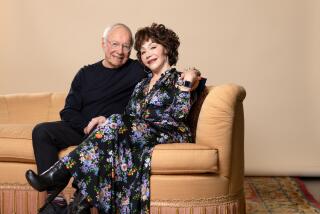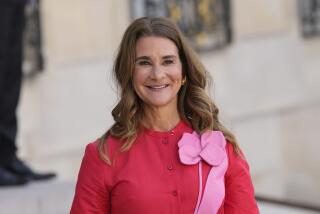Laurance Rockefeller, 94; Venture Capitalist Active in Conservation Work, Philanthropy
- Share via
NEW YORK — Laurance Rockefeller, a conservationist, philanthropist and leading figure in the field of venture capital, died in his sleep Sunday morning. He was 94.
The cause of death was pulmonary fibrosis, spokesman Fraser Seitel said in a statement.
Rockefeller was No. 377 on this year’s Forbes magazine list of 587 billionaires, with $1.5 billion. But he was perhaps best known for his environmental work: He served under five presidents in several capacities related to conservation and the outdoors.
He founded the American Conservation Assn. in 1958, and was the head of Jackson Hole Preserve Inc., a conservation organization that played a major role in protecting parts of the Grand Tetons in Wyoming and redwoods in California.
In 2001, Rockefeller donated his $30-million, 1,106-acre JY ranch -- the first dude ranch in the Tetons -- to the federal government to be incorporated into surrounding Grand Teton National Park. The ranch section will open to the public in 2006.
His father, John D. Rockefeller Jr., helped create the park in 1929 and personally donated 32,000 acres for the preserve. At the 2001 presentation of the JY ranch to Interior Secretary Gale A. Norton and Vice President Dick Cheney, Laurance Rockefeller said the property would help complete his father’s vision for the area, which both men considered a “uniquely magnificent landscape.”
Rockefeller helped develop national parks in Vermont, Wyoming and the U.S. Virgin Islands, and led the White House Conference on Natural Beauty.
He also was a pivotal developer of the economics field that became known as venture capital. In 1938, he helped finance World War I pilot Eddie Rickenbacker’s Eastern Airlines, and later invested in and served as a director of McDonnell Aircraft Corp. As electronics developed, he invested in Intel Corp. and Apple Computer Inc. as part of his continuing effort to fund ventures that would strengthen national security, welfare or the economy.
“As his younger brother, I always admired Laurance for his extraordinary business skills, and often followed his lead by joining him in the field of venture capital, where he was a true pioneer,” said David Rockefeller, the last remaining child of John D. Rockefeller Jr.
Recognized by his siblings for his investment expertise, Laurance Rockefeller became president of Rockefeller Brothers Inc. in 1946, leading the family in investigating and financing new business projects.
Laurance Spelman Rockefeller was born on May 26, 1910, in New York, and was the fourth of six children of John D. Rockefeller Jr. and Abby Aldrich Rockefeller. He graduated from Princeton University in 1932 and studied law at Harvard University for two years. He was married to Mary French from 1934 until her death in 1997.
Rockefeller served in the Navy during World War II and became a lieutenant commander, working primarily in the Navy’s bureau of aeronautics as liaison officer to airplane production facilities on the West Coast.
He was a director of New York City’s Rockefeller Center, built by his father, from its inception in the 1930s, and in the 1950s served as chairman of the business and entertainment complex, which includes Radio City Music Hall.
Rockefeller served on the board of New York’s Memorial Sloan-Kettering Cancer Center and became the first recipient of the American Cancer Society’s Alfred P. Sloan Memorial Award for his contributions to cancer research.
He is survived by four children, Laurance, Laura, Lucy and Marion; eight grandchildren; and 12 great-grandchildren. His nephew is U.S. Sen. John D. “Jay” Rockefeller IV.
The vast Rockefeller fortune was founded by Laurance’s grandfather, John D. Rockefeller Sr., a bookkeeper who saved his money, invested it and built Standard Oil trust, becoming the nation’s first billionaire.
After the U.S. Supreme Court broke up the oil company trust in 1911, the patriarch turned to philanthropy, a discipline he passed on to his progeny.
More to Read
Inside the business of entertainment
The Wide Shot brings you news, analysis and insights on everything from streaming wars to production — and what it all means for the future.
You may occasionally receive promotional content from the Los Angeles Times.










